- Home
- Michelle Hodkin
The Evolution of Mara Dyer Page 30
The Evolution of Mara Dyer Read online
Page 30
It was like being picked last for dodgeball, only so much worse.
Suddenly, there was a crash of ceramic hitting stone behind us.
I turned. Phoebe was standing near a toppled pedestal; a vase had shattered on the floor. Her face was red and her damp hair stuck in sweaty tendrils to her cheeks. You could hear a pin drop. Everyone was absolutely silent as Phoebe gulped in a few breaths, then reached for one of the shards.
“Phoebe!” an adult voice shouted. Soon, there were more adults in the room than I ever remembered seeing at Horizons individually.
“No one’s listening to me,” she wailed, but before she could grab one of the pieces of the smashed vase, Wayne had managed to get hold of her. He lifted her up and away.
“Page Kells, then get her journal,” I heard Brooke whisper to him. Phoebe was thrashing wildly but then Barney showed up and stood in front of her, blocking my view. Phoebe’s cries died away. When I saw her next, she was rag-doll limp in Wayne’s arms. He carried her out.
Jamie and I made eye contact.
“Weirdo,” Jamie said.
“Understatement,” I replied.
Jamie leaned in and whispered, “How’s your ass?”
“I’ll survive.”
“Saw that coming a mile away.”
“Me too. But that roommate thing? Worst. Ever.”
He raised an eyebrow.
“I’m the creepy girl. In a mental hospital.”
He grinned. “Nobody’s perfect.”
59
THERE WAS A DEFINITE ADVANTAGE TO PHOEBE’S sedation: For the rest of the day, I wouldn’t have to listen to her talk. And tonight?
I wouldn’t have to worry that she would wake up.
I passed Noah a note, mimicking his from yesterday:
Tonight at one by the music studio? Make it happen?
When I caught his eye during dinner, he nodded yes. Each second fell away as the clock slipped forward. I wished, I needed, everyone to sleep. I conjured mental images of empty hallways. Of Barney in the common room, asleep in front of the television with his headphones on. Of Brooke in bed. No one needed to use the bathroom. No one felt like they had to monitor the halls. I imagined I could hear the sounds of everyone else turning over in their beds, rustling in their sheets, breathing quietly into their pillows.
And then it was time. I slipped off my blanket and slipped on my hoodie. I pulled it over my head and zipped it up to quiet the sound of my ferociously beating heart. When I shifted to stand, the mattress groaned and my eyes darted to the other side of the room.
Phoebe was sleeping.
I tiptoed to the door and opened it as softly as I could. The second I did, someone somewhere coughed and my heart leapt into my throat. I waited there in the doorway for what felt like hours.
Nothing.
I left the room. I walked down the hallway. And each time I passed another doorway, my heart stopped. When I rounded the corner by the common room, directly in front of the counselor’s desk, I mentally prepared myself to be directed back to bed.
But no one was there.
I practically ran the rest of the way to the studio. Where was everyone? The bathroom? Sleeping?
It didn’t really matter and I didn’t really care, because Noah stood in the silent corridor waiting for me, and I wanted nothing more than to fly into his arms.
I didn’t. I stopped.
“You made it,” he said with a smile.
I returned it. “You too.” I reached for the door to the music room, but I noticed the keypad.
“Are you serious?” I whispered through gritted teeth.
Noah hushed me, then pressed a series of numbers on the pad. I looked up at him incredulously.
“Everyone has a price,” he said, as the door in front of us clicked open. He held the door open for me, and I walked through.
The dark was impenetrable. Noah’s fingers twined around mine as he led me forward, and then down to the carpeted floor.
My eyes began to adjust somewhat to the darkness in the room. There was a small window at the far corner, letting in a sliver of moonlight that illuminated the planes and angles in his expressionless face.
He sat with his back against the wall, statue-still and cold. He withdrew his hand from mine.
I reached out to take it back, but he said, “Don’t.” His voice was laced with contempt. Poisonous.
“Don’t what?” I asked flatly.
His jaw locked, and he stared at me with empty eyes.
“What’s wrong?”
“I don’t—” he started. “I don’t know what to—” He glanced down.
At my wrists.
So that’s what this was about. Noah wasn’t furious with me. He was furious with himself. It was hard to recognize still, because I was the opposite. I turned outward with anger. Noah turned in.
I put my hands on either side of his face, not gentle and not soft. “Stop it,” I said, my voice harsh. “You aren’t the one who hurt me. Stop torturing yourself.“
Noah’s expression didn’t change. “I wasn’t there.”
“You were trying to help,” I said. “You were trying to find answers—”
His slate blue eyes looked like iron in the darkness. “I swore I would be there for you and I wasn’t. I swore you would be safe, and you weren’t.”
“I’m—”
“You were terrified,” he said, cutting me off. “When you called me, I’ll never forget your voice.”
“Noah.”
“You told me about the notebook you didn’t remember writing in and I had never heard you—I’d never heard you sound like that.” His voice grew distant. “I scrambled to get to Boston to make the other flight the second we hung up. I did, and I was trapped on that fucking plane while he forced you—”
Noah didn’t finish his sentence. He nearly vibrated with rage, with the effort it took not to scream. “I felt you dying beneath my skin,” he said, his tone hollow. “I called Daniel from the plane—I dialed again and again until he woke up.” Noah met my eyes. “I told him you were going to kill yourself, Mara. I didn’t know how else to explain—what I saw.” His face was drawn in fury.
I wanted to draw something else.
My fingers traced the fine, elegant bones in his face. “It’s okay.”
“It is not okay,” he snapped. “They had you committed. They sent you here because of what I told them.”
“Because of what Jude did.”
He laughed without humor. “Your mother said I couldn’t see you—that you had to deal with this as a family now, and that they were going to send you somewhere for proper help. I couldn’t comprehend it—that the last time I heard your voice for months, it would be riddled with terror as you begged for your life.” He closed his eyes. “And I wasn’t there.”
“You were at the hospital,” I said, brushing my thumb over his beautiful mouth. “Daniel said you didn’t leave.”
Noah opened his eyes but avoided mine. “I managed to see you, once.”
“Really?”
He gave a short nod. “You were unconscious. You were—they had you in restraints.” He said nothing for what seemed like a very long time.
We didn’t have enough of it. There was so much he still didn’t know.
“I saw Abel Lukumi,” I said.
Noah’s brows drew together. “What?”
“In the hospital. On the second day, I think. When I woke up—my mother told me why I was there and I . . .”
Freaked out. I freaked out, and they sedated me. “I tried to explain to her what happened, with Jude, but I—I lost it,” I said. “Before the drugs kicked in, I saw Lukumi by the hospital room door.”
Noah was silent.
“It wasn’t a hallucination,” I said firmly, because I was afraid he was thinking it. “You didn’t see him in the building, did you?”
“No” was all he said.
Of course not. I went on to tell Noah about everything else that happened t
hat night—about finding the unmarked disc in my room, and what was on it. I told him about seeing Rachel, watching her through the lens of Claire’s video camera. Watching the asylum collapse.
I left out the part about hearing my laughter after it did.
When I finished, Noah said, “I should never have left you.” He shook his head. “I thought John would be enough.”
“You trusted him. He watched the house for days, and everything was fine.” I paused, then asked, “What happened?”
“He had a stroke. Just sitting there, in the car.”
I felt like I’d been bathed in ice. I tried not to sound as freaked out as I felt. “So did the officer.”
“What officer?”
“When Jude—at the dock,” I said, choosing my words carefully. “At the marina, before I passed out—there was a man, an off-duty cop, who came to help when he saw me hurt. He tried to call for help but then Jude—”
Jude stabbed himself in the side.
I still couldn’t make sense of it—the images in my memory bled into one another, and the feelings, too. Terror and rage, fear and panic. So I described what happened on the dock to Noah—he had seen it, but from a different perspective. Maybe together, we could connect the points.
“There were dead fish under the dock,” I said to him as his eyes sharpened. “Just floating in the water.”
Like the Everglades, I thought, remembering Noah’s words. We had been trapped in the creek. I had to get to Joseph but couldn’t. There were only two choices: fight or flight, and I couldn’t flee. I was backed into a corner. So without thinking, my mind fought.
My fear killed everything in the water around us. Alligators. Fish. Everything. And I was afraid at the marina, too. I was terrified of Jude. He didn’t die, but in trying to kill him, did I kill everything around me too?
Did I kill the police officer? The one who tried to help?
My throat burned with the thought and my stomach twisted with guilt. But then I remembered—
John. He also died of a stroke. And I hadn’t even seen him that night. I might be responsible for the rest of it, but not him.
My mind churned, trying to work through it. I glanced up at Noah, wondering what he was thinking, so I asked.
“I wasn’t there,” he answered, with that same vacant look.
I moved toward him then. Slid my arms around his neck and drew him against me. Noah winced at the contact. I ignored it. Now that we were this close, I could see what I missed before.
Noah acted like he felt nothing because he felt everything. He seemed not to care because he cared too much.
I smiled against his lips. “You’re here now.”
60
NOAH’S VOICE SLICED THE AIR LIKE A RAZOR blade when he spoke. “I’m here because you’re alive, Mara. If he had killed you—”
“He didn’t,” I said, and the words lingered in my mouth. “He didn’t kill me,” I repeated, and edged my back up against the wall as the words transported me to the marina. I saw myself prone and bleeding on the dock.
I could not look away from the deepening gashes on my wrists.
Not fatal.
But Jude knew. I could tell by the way he was staring at the cuts as he held my forearms, studying them. To make sure I bled, but not too much. He didn’t want to kill me. He wanted something else.
“Jude left me alive,” I said out loud. “On purpose. Why?”
Noah ran a hand over his shadowed jaw. “To live so he could torture you another day?” He smiled, and it was full of malice. “If only I’d had enough time in central holding to make friends.”
I looked up, surprised. “You were in jail?”
Noah shrugged, his shoulder moving against mine.
“When was this?”
“When I found out they were sending you here and there was nothing I could do. The situation demanded something . . .” Noah searched for the right word. “Outlandish. I had to convince my father that I would be an embarrassment to him—a public one—every second I couldn’t be with you.”
“Wait—was this after the Lolita incident?”
Noah gave a brief nod.
“Noah,” I said cautiously. “What did you do to that poor whale?”
He cracked a real smile, then. Finally. I wanted to make him smile like that for the rest of my life.
“She’s fine,” he said. “I only pushed someone into her tank.”
“You didn’t.”
“A little bit, yes.”
I shook my head in mock disdain.
“He was encouraging his budding sociopath child to bang on the glass,” Noah said, his voice matter-of-fact.
“What were you even doing there?”
“Looking for a fight. I needed something that would make the news.”
“Oh my God, it did?”
“I was this close,” he said, and held his thumb and forefinger a fraction apart. “Edged out by a corrupt politician.”
“You were robbed.”
“Indeed. My father paid them off, I think.”
I watched Noah closely when I asked my next question. “So your father knows about us, then?”
“Yes,” Noah said evenly. “He does.”
“And?”
Noah raised his eyebrows. “And what?”
Boys. So impossible. “What does he think?”
Noah looked like he didn’t understand the question. “As if that matters?”
Ah. He understood the question, he just didn’t know why I was asking. “It does matter,” I said. “Tell me.”
“He thinks I’m a fool,” Noah said simply.
I tried not to show how much that hurt.
Apparently I failed, because Noah took my hands in each of his. It was the first time he touched me like this, like it mattered, since before Jude took me. His touch was impossibly gentle as he unwrapped the bandages on my wrists, but it still hurt and I began to protest. He hushed me. He lifted my hands to his mouth. His petal-soft lips brushed over my knuckles, then my palms. Noah looked into my eyes and owned me.
And then he kissed my scars.
“It doesn’t matter,” he murmured against my skin. His fingers traced the cuts, healing the veins beneath them. “There’s only one thing that does.”
“What?” I whispered.
He looked at me through his long, dark lashes, with my hands still in his. “Killing Jude.”
61
NOAH’S HANDS WERE GENTLE AND HIS VOICE was soft, which made his words somehow even more chilling.
I wanted to kill Jude. I’d thought about it many times. But those words in his mouth sounded wrong.
Noah let go of my hands. “I made arrangements before I came here to have more people watch your family, but I don’t think Jude’s going to go after them,” he said, staring straight ahead. “Everything he’s done—it’s been to get at you. He said he took Joseph because he wanted to make you hurt him yourself, knowing that’s exactly what would torture you the most.”
I swallowed. “But now I’m in here. And so are you.”
Noah was silent for a moment. Then said, “Not forever.”
Something in his voice scared me, and drew my eyes to look. Noah was beautiful—always—but there was something dark now beneath those perfectly carved features. Something new.
Or maybe it was always there, and I had just never seen it.
My pulse began to race.
Noah turned to me, the movement fluid and graceful. “The girl I saw—Stella, yes?”
I nodded.
“What do you know about her?” He sounded like himself again, and I felt relieved without quite knowing why.
“Not much,” I admitted. “Jamie said something about her almost passing for normal, but I don’t know what she’s in here for.” I felt a little bad now that I hadn’t bothered to find out, but in my defense, I’d been a bit preoccupied. “Why?”
Noah ran his fingers through his hair. “Have you noticed anything different about
her?”
“Different as in . . .”
“Like us.”
“Nothing obvious,” I said, with a shrug.
Noah arched an eyebrow. “Our abilities aren’t exactly obvious, either.”
True. “So you think she’s like us?”
“I wonder. There has to be some kind of reason I’ve seen you and her. Think about it—there are millions of injured and sick people everywhere. But I’ve seen only five. The only thing I can think of that connects us is—”
“But that would mean . . . Joseph.” I could not fathom him sharing this misery.
“I think whatever we have is acquired,” Noah said carefully; he must have guessed my fear. “If Stella’s here, she has a file like everyone else, and it will mention her symptoms. Maybe she shares some of yours?”
And my grandmother’s.
But if my grandmother and I were both different in the same way, it had to be hereditary, which meant Noah was wrong. All of this could happen to Joseph, too.
Noah ran a hand over his jaw. “It might show some kind of connection—something we’re missing.”
Something we’re missing. The words sparked an image of Phoebe crying and rocking on the floor while Brooke reassured her, then smiling behind Brooke’s back. “We should check Phoebe’s, too,” I said, though the idea of her being like us was a horrifying thought.
And I had an equally horrifying thought—if Stella and Phoebe were like me and Noah, there was another thing we had in common.
We were all here.
I glanced at the tiny window in the music studio. Branches were thrashing in the wind, but despite the chaos outside, the room was quiet. The sky was still dark.
“We should go now,” I said to Noah, and we rose from the floor together. “How are you going to get their files?”
“The same way I got us into this room,” he said, flashing his crooked grin. “With a bribe.”
Noah led me up and out of the studio and into the hall. I didn’t want to risk a whisper, especially not in front of Dr. Kells’s door. It had an identical keypad, I noticed. But what if she was in there?
Noah shook his head when I asked my question out loud. “She’s only here a few times a week—and she definitely wouldn’t be in there at this hour.” He pressed a series of different numbers this time. Fewer. The door opened with a click.

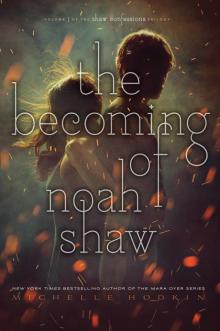 The Becoming of Noah Shaw
The Becoming of Noah Shaw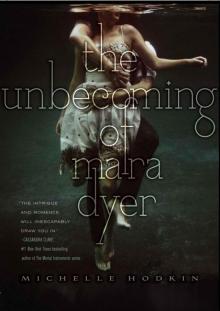 The Unbecoming of Mara Dyer
The Unbecoming of Mara Dyer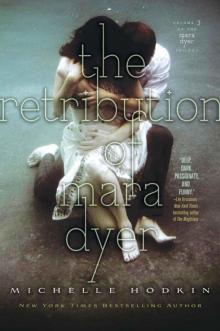 The Retribution of Mara Dyer
The Retribution of Mara Dyer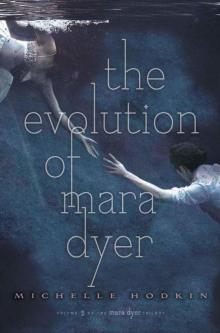 The Evolution of Mara Dyer
The Evolution of Mara Dyer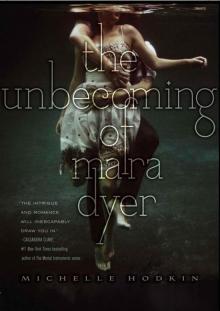 The Unbecoming of Mara Dyer md-1
The Unbecoming of Mara Dyer md-1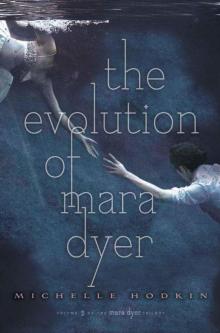 The Evolution of Mara Dyer md-2
The Evolution of Mara Dyer md-2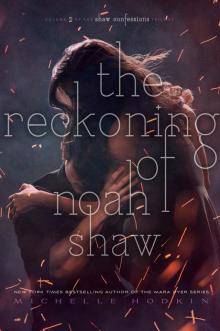 The Reckoning of Noah Shaw
The Reckoning of Noah Shaw